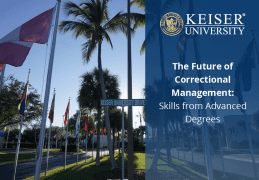In a presentation titled Artificial Intelligence and the Emotional Truth, Professor Rebecca Jensen, Keiser University’s Flagship Campus Program Director of General Education and Interdisciplinary Studies, recently shared insights relating to generative artificial intelligence technology and its intercession with student learning.
While noting that educational leaders globally are carefully developing protocols to navigate the breakthrough technology, Jensen shared that its place in the educational realm is very specific. “As with any tool, it needs to be paired with critical thinking skills and academic integrity to be acceptable within education,” said Jensen while adding that human penmanship holding ‘emotional truth,’ will always hold intrinsic value. “The Emotional Truth is a concept used in creative nonfiction writing which, put simply, allows writers the freedom to make mistakes. We forgive writers for misremembering minor details when the heart of the story is true to them and helps us to understand the human experience. Students fear failure and call on AI to ensure they get the ‘correct’ answer when writing what is true to them would usually give a more accurate response to an assignment,” she said.
Jensen joins the conversation as part of a Keiser University committee formed to address AI use and to provide policies and guidelines for instructors. Her Top Five AI Insights include:
- Plagiarism and academic dishonesty will always be prioritized in academia– just because we are not asking a human for an answer does not mean we can or should pass off an AI-generated submission as belonging to us. Plagiarism happens when we claim work that is NOT ours to be our own, no matter where it comes from.
- There are real-life consequences to passing off work as our own—take the SAG-AFTRA writer’s strike this past year or the lawsuits authors are pursuing because AI is either “writing” original work or stealing from existing work to “improve” its thinking.
- Writer’s block does not get “solved” by using AI; instead, we are delaying it. Practicing helps us to improve in any skill and writing is no different.
- Time is not “saved” when using AI—it might feel like we spent less time and energy working on an assignment NOW, but when faced with a real-life challenge in the same content area later on (in life or our majors) students may find they cannot recall the knowledge they seemingly understood in class. AI does not help us understand concepts; it just helps automate tasks.
- It is healthy to embrace a little fear—fear of failure serves as a primary reason people turn to AI to automate tasks; fear of failure should motivate us to truly learn new concepts and become better in our fields.
Professor Jensen teaches Composition, Creative Writing, Literature, and other English courses. She earned her MFA in Creative Nonfiction at Florida Atlantic University in 2017, and her BA in English from the University of South Florida in 2014. She is a reader for Orca, A Literary Journal, and has served as Managing Editor and Nonfiction Editor for FAU’s Coastlines. Her writing appears in multiple literary magazines including Musing Publications, The Moving Force Journal, Entropy, Parhelion, and HAD—where her story, “Bloom,” was nominated for a Pushcart Prize.
Keiser University is a private, independent, non-profit university serving nearly 20,000 students at 21 Florida campuses, online, and two international sites. Founded in 1977 by Chancellor Arthur Keiser, Ph.D., and Evelyn Keiser, Keiser University currently offers more than 100 degrees from associate to the doctoral level. Keiser University is a designated Hispanic-Serving Institution, a member of the Hispanic Association of Colleges and Universities, and was ranked No. 21 in the U.S. in Social Mobility by U.S. News and World Report in 2023-24.

Rebecca Jensen, Keiser University’s Flagship Campus Program Director of Interdisciplinary Studies and General Education recently shared top tips relating to artificial intelligence and the educational realm.





 The instructors at Keiser University impacted my life. They believed in my ability to become a great graphic designer, regardless of how I felt about my skills. KU helped to prepare me for the real world and got me to where I am today.
The instructors at Keiser University impacted my life. They believed in my ability to become a great graphic designer, regardless of how I felt about my skills. KU helped to prepare me for the real world and got me to where I am today.
